As we begin our last- weekend-of-the-semester-scramble to turn procrastinated projects into academic artwork, summer is on the horizon. Before long, we’ll be trading Blue Books for Netflix and abandoning the Quad for the beach.
Then, there are those of us who will be working all summer to fund the fall semester’s rent and coffee addictions. Not quite as desirable but still a productive use of time.
Working for $7.25 an hour — whether serving fried chicken and waffles or sweeping movie theaters — is frustrating and often disheartening. It’s not surprising these so-called entry level positions come with little feeling of accomplishment or productivity.
But even with the heavy workload and light paychecks, most minimum wage jobs aren’t lacking applicants. In the past two years, I’ve heard many triumphant students brag in class about landing jobs at prime locations, ranging from on-campus positions at the Middleton Library Print Desk to a position at Raising Canes on Highland.
The positions come with the benefit of close proximity or are on the Tiger Trails bus route, helping out with those gas prices that are higher per gallon than your GPA. But if Cane’s ever follows the lead of Hungry Howie’s, which is open until 4 a.m., the workers could find themselves closing up shop well after their classmates crawl out of Tigerland. This trend could be detrimental to a student’s already suffering sleep schedule.
These additional factors force your hand when choosing whether to work for $7.25 an hour serving fried chicken on State Street until 2 a.m. or trekking across Baton Rouge midday for a 3 p.m. to 8 p.m. shift at a $9.00-plus an hour clothing store job in the Mall of Louisiana.
Ask any American about the job market and they’ll tell you it’s rough. Blaming issues such as job creation and illegal immigrants, politicians have promised voters they could solve our financial crisis, but few have acknowledged the Americans’ plea for minimum wage regulation overhaul.
According to a Quinnipiac University poll from earlier this year, 71 percent of American voters support raising the minimum wage, with more than 51 percent supporting a minimum wage of upwards of $10 an hour. Still, senators voted down a bill that would increase the minimum wage nationwide to $10.10 just last week.
An entire generation is working hard for a less-than-livable wage, and it’s depressing when you inevitably begin to associate your worth as a human with your ability to pay the bills.
Think about it this way: The only reason you are being paid minimum wage is because, legally, your boss can’t pay you less. And believe me, if they could, they would.
Those who oppose a minimum wage increase are quick to say that employers would sooner cut positions than increase their present staff’s pay. I predict some employers would, and they’d see their business suffer as employees struggled to adjust to a larger workload so the boss could make more money for themselves.
Ask Bobby Jindal for his opinion, and you get a response fueled by personal prejudices, calling the economy since Obama’s election a “minimum wage economy.” I’m sure it was an oversight, but Jindal was right, sort of.
We’re a minimum wage economy because politicians have allowed their hands to become tied while they are wined and dined by businesses funding political agendas. And with the U.S. Department of Commerce reporting almost 13 million Americans are on welfare programs as of January 1, it’s the government that’s picking up the bill.
A business that values its employees and treats them with respect is a business that will succeed. We are the 20, 19 and 20-somethings trying to find financial independence while also working toward a degree. We are certainly not property to be rented at a single-digit-per-hour wage.
Students working for minimum wage aren’t paid enough to support themselves, let alone smile as they hand you a burger worth more than an hour of their time.
This University is filled to the brim with students who work hard and enthusiastically for the little they receive. They take out hefty student loans and dine on a feast of ramen and tap water semester after semester to be able to pay for rent, electricity, water, Internet, groceries, gas and school expenses.
I urge Louisiana’s leaders to recognize our hard work and give us a break, instead of siding with the business owners who don’t want to fork over any of their
six-or-seven-or-eight figure salaries to pay those individuals responsible for their summer profits — the minimum wage workers.
Jana King is a 19-year-old communication studies sophomore from Ponchatoula, La.
Opinion: Minimum wage jobs add to hefty workload for students without much reward
By Jana King
May 1, 2014
Nearby restaurants are some of the minimum wage-paying businesses where students work because of their close proximity to LSU’s campus.
More to Discover









